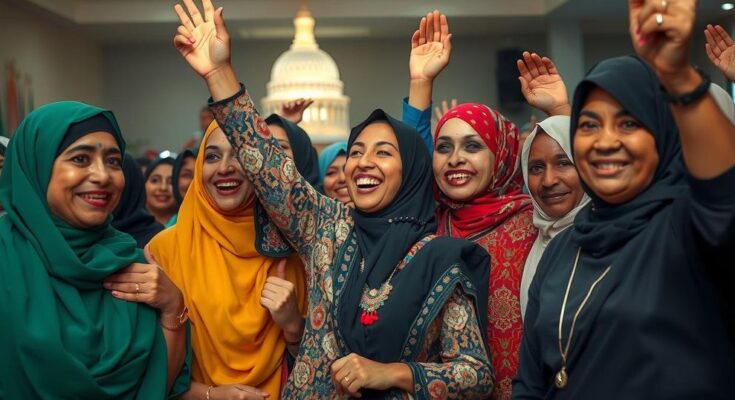Rashida Tlaib and Ilhan Omar, both Muslim women in the U.S. Congress, were re-elected on Wednesday. Tlaib, a Palestinian-American from Michigan, won 70 percent of the votes, while Omar, a Somali-American from Minnesota, received 75.2 percent. Both legislators are vocal critics of U.S. policies toward Israel and enjoy strong community support.
On Wednesday, Rashida Tlaib and Ilhan Omar, two prominent Muslim members of the U.S. House of Representatives, were re-elected to Congress. Rashida Tlaib, the first Palestinian-American woman in Congress, secured her fourth term representing Michigan’s 13th District, garnering a substantial 70 percent of the vote against her Republican opponent, James Hooper, who received 26 percent. Meanwhile, Ilhan Omar, the first Somali-American in Congress, triumphed in her re-election bid for a third term from Minnesota’s 5th District, achieving 75.2 percent of the votes. Both lawmakers are noted for their outspoken criticism of U.S. policy towards Israel and possess strong support within their respective communities.
The re-election of Rashida Tlaib and Ilhan Omar represents a momentous achievement for Muslim representation in American politics. Tlaib, who is known for her vigorous advocacy on behalf of Palestinian rights, continues to be a pivotal voice for the Arab-American community. Omar, a former refugee whose personal journey resonates with many, has similarly become an influential advocate for immigrant rights and social justice. Their successes illustrate the increasing diversity in the U.S. legislative body, especially among women and minority groups.
The successful re-election of Rashida Tlaib and Ilhan Omar highlights the evolving dynamics of representation within the U.S. Congress. Both women have proven to be significant voices in legislative discussions around civil rights and foreign policy, particularly regarding Israel. Their electoral victories not only signify personal accomplishments but also reflect the growing diversity and inclusivity in American politics, marking a notable period in the nation’s democratic landscape.
Original Source: dunyanews.tv




